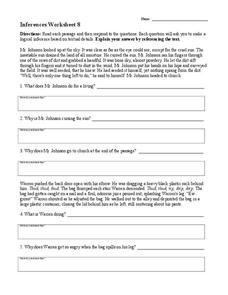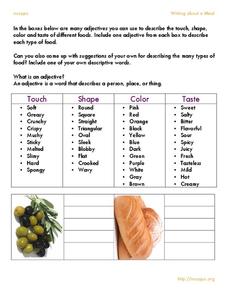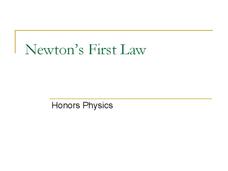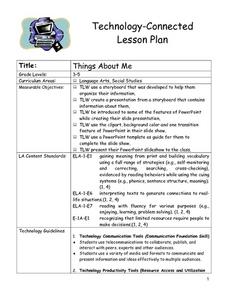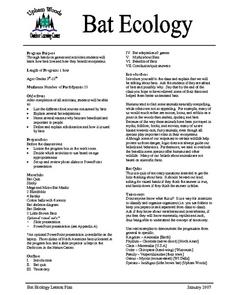Read Works
Edison Tried and Tried Again
How many times did it take Thomas Edison to invent a successful working lightbulb? Young learners read a short passage about this famous inventor and his determination in getting an idea to work successfully. Then, pupils respond to four...
Polar Trec
Why Can’t I Eat This Fish?
Can turning on the television lead to toxins in the food supply? The instructional activity offers an opportunity for young scientists to complete guided research. A worksheet lists each question as well as the web page necessary to...
Reading Worksheets
Inferences Worksheet 8
Lead your class toward mastery of making inferences with a straightforward worksheet. Pupils read four short passages and make inferences based on the questions asked about each passage. They explain their reasoning for each inference by...
Kentucky School for the Deaf
Levels of Organization within an Ecosystem
From tiny organisms to entire biomes, young scientists examine the interdependent relationships tying all living and non-living things together with this collection of ecology resources.
Nosapo
Writing about a Meal
You don't need to be a food critic to describe your meal accurately! A series of activities introduce learners to vivid adjectives when writing about the taste, smell, and feel of food. After working with word choice, parts of a...
Inside Mathematics
Squares and Circles
It's all about lines when going around. Pupils graph the relationship between the length of a side of a square and its perimeter. Class members explain the origin in context of the side length and perimeter. They compare the graph to the...
Computer Science Unplugged
The Chocolate Factory–Human Interface Design
What is this? What is it for? How does it work? Challenge the class to think about to how to design a new chocolate factory for the Oompa-Loompas to make it easy to use. The activity is the first of a three-part series on computer-human...
California Academy of Science
Be Prepared for an Earthquake
Earthquakes can be frightening and dangerous, but being prepared can make a world of difference. Perform an earthquake simulation during which the class practices how to drop, cover, and hold on as you read a script describing what might...
Civil War Trust
Civil War Personalities Lesson Plan
Caring, trustworthiness, and responsibility—these are only a few character traits in focus of a lesson based on stories from the Civil War era. Class members explore several influential lives while reading biographies that highlight...
Balanced Assessment
Multi-Graphs
So many things change as time goes by. Here, scholars create graphs based on this premise. Each problem asks pupils to sketch a graph that describes a given situation. Their graphs represent various characteristics such as height,...
Bowels Physics
Newton's First Law
Force acts on objects in mysterious ways ... until now! A comprehensive presentation explains the balance of forces acting on objects. Learners draw free body diagrams to show these invisible forces and make force calculations.
Curated OER
Things About Me
Students watch as the teacher explains how to use a storyboard to plan a PowerPoint presentation. They examine how to use clip art, background colors, and at least one transition before creating a PowerPoint presentation according to the...
Curated OER
Bat Ecology
Young scholars, through hands on games and activities, discover how bats live and how bats benefit ecosystems. They play a game designed to show them how echolocation works and another to show how mother bats locate their young through...
Curated OER
Sliding Along
Third graders explore the concept of linear measurements and how they work. Coins are used to reinforce the process.
Curated OER
Magnetism
In this magnetism worksheet, students answer ten questions about magnets, their magnetic poles, the magnetic lines of flux and how magnets work.
Curated OER
Time Management: Piece of Pie
Students examine their own lives and how well they manage their time outside of school. In this this time management lesson, students discover the amount of time they spend on other activities, and create a pie chart with that...
Curated OER
Magnetic Fields and Bermuda Triangles
Students map magnetic fields of a magnet using a compass and predict where fields cancel each other to create 'Bermuda Triangles'. In this magnetism lesson, students use a compass to map the magnetic field of a magnet. They explain how...
Curated OER
What is An Electromagnet?
Students explore and define electromagnets. In this electromagnet lesson, students access an assigned web site to research what an electromagnet is and how it works. They complete a database with information from the web site and...
Curated OER
Habitat
Learners are able to define habitat. They are able to identify the four things that living things need to survive. Students are able to describe how living things are adapted to their habitats.
Curated OER
Micro-organisms
Students learn what a micro-organism is. In this micro-organism lesson plan, students understand that micro-organisms may be too small to see. Students learn microorganisms could be bacteria, fungi, something beneficial or a harmful...
Curated OER
Introducing Working Animals
Students identify ways humans and animals work together. In this animal welfare lesson, students read the text Hanni and Beth: Safe and Sound and define the term "working animals." Students investigate working animals by visiting various...
Curated OER
Cell Works
Learners observe slides of cork cells and discuss the use of microscopes. They view a power point presentation on "Looking Inside Cells" and take notes aligned with the PPT presentation. They collaborate with a partner to create an...
Jamestown-Yorktown Foundation
Making a Patriot Inquiry: Are Independence, Freedom, and Liberty the Same Thing?
As part of a study of the American Revolution, class members engage in an inquiry-based lesson that has them watch a scene from the play Slave Spy, examine multiple primary source documents, and then discuss the similarities and...
Scholastic
My Favorite Activity (Grades K-2)
Scholars discuss the many ways they use persuasion in their everyday lives and brainstorm specific ideas for encouraging someone to do something. With the list of persuasive techniques they made, young writers complete a graphic...




